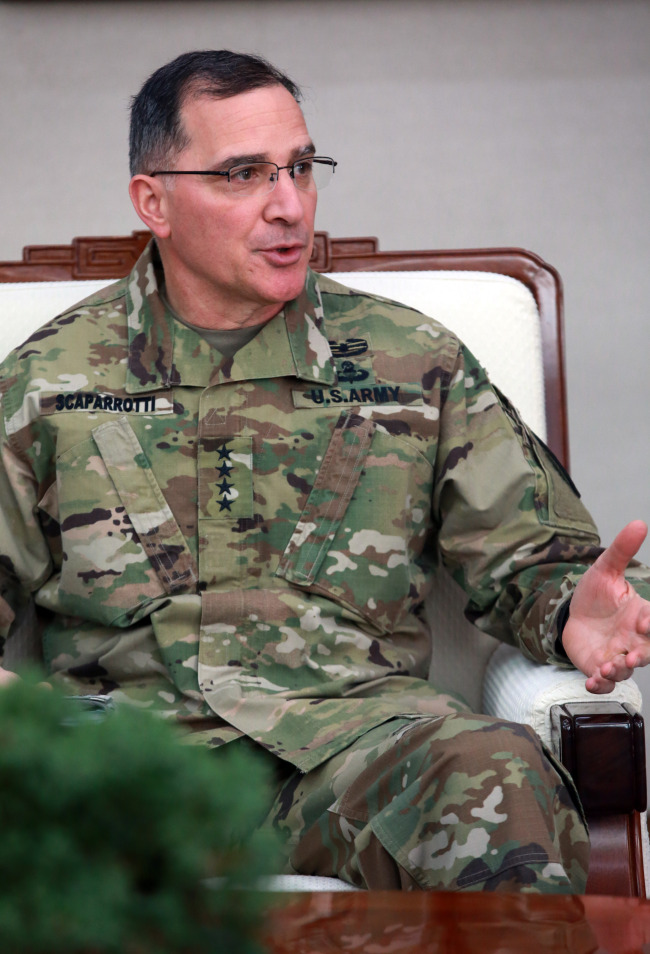Gen. Curtis Scaparrotti, the commander of U.S. Forces Korea, told the U.S. House Armed Services Committee on Wednesday that the first meeting of the joint working group for deployment of an advanced missile defense system in South Korea is expected within a week.
Scaparrotti said that the Terminal High Altitude Area Defense system is a “complex system” and it would take some time to find the right location for it. The allies have been discussing THAAD deployment since North Korea conducted a nuclear test and fired a long-range rocket.
 |
USFK Commander Gen. Curtis Scaparrotti (Yonhap) |
The announcement, however, came as a surprise to members of the South Korean media, who did not receive a heads-up from the USFK or the Ministry of National Defense. It was the second such ambush since the Tuesday retraction by South Korea of its original plan to announce the launch of the talks that day.
The latest news apparently caught even the military off guard, as Defense Ministry deputy spokesman Na Seung-yong said the officials had learned of Scaparrotti’s comments via a news report.
“I have yet to confirm if Scaparrotti spoke of his personal opinion, or if he had checked (with the South Korean military) beforehand,” he said.
The incident hints at a lack of communication between the U.S. military and both the South Korean military and members of the local media.
Despite repeated requests from reporters, no member of the USFK was present at a media briefing held Thursday, as was the case throughout the discussion about THAAD talks. The U.S military’s lack of effort to reach out to the media has sparked off complaints that it is deliberately disregarding the media and Korean citizens’ right to know.
More importantly, it has also raised questions about the role of South Korea in the THAAD issue.
On Tuesday morning, merely an hour before the scheduled time to announce the launch of working-level talks, the ministry abruptly announced that the announcement would be delayed by “one or two days.”
Although the Defense Ministry has repeatedly stated that both Seoul and Washington are on an equal footing on the issue of THAAD deployment, recurring last-minute flip-flops for the talks have suggested otherwise about who is in the driver’s seat.
“Even we (the ministry) were caught off guard as well. We were revising the wording in our statement when we heard the news,” said a military official, adding that the request had been made by Washington.
The suspension coincided with Chinese Foreign Minister Wang Yi’s meeting with U.S. Secretary of State John Kerry. It stoked speculation that the U.S. has put off THAAD deployment talks in consideration of its powerful rival, particularly since it has been attempting to get China to agree on a new U.N. Security Council resolution and stronger sanctions against North Korea.
After the White House announced Wednesday that Washington and Beijing had reached an agreement on the sanctions, some South Korean observers even raised the notion as to whether the U.S. may rethink stationing THAAD on the peninsula. China has feverishly argued against deployment of THAAD here, saying it will dent its security interests. As of this point, the possibility of the allies retracting their THAAD plans looks unlikely, at least according to the Defense Ministry. Deputy Spokesman Na said that the ministry stands firmly by its initial stance that anti-Pyongyang sanctions are not related to deploying THAAD in South Korea.
But the weight of the Defense Ministry’s statements remains questionable after a series of about-faces and ambiguous responses that have worn down the public’s right to be informed about the issue which has been touted as crucial for national security against North Korea’s burgeoning threat.
By Yoon Min-sik
(
minsikyoon@heraldcorp.com)




![[Herald Interview] 'Trump will use tariffs as first line of defense for American manufacturing'](http://res.heraldm.com/phpwas/restmb_idxmake.php?idx=644&simg=/content/image/2024/11/26/20241126050017_0.jpg)

![[Health and care] Getting cancer young: Why cancer isn’t just an older person’s battle](http://res.heraldm.com/phpwas/restmb_idxmake.php?idx=644&simg=/content/image/2024/11/26/20241126050043_0.jpg)

